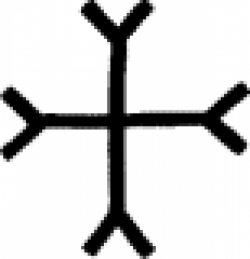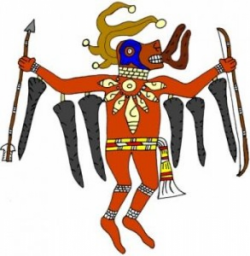What's the meaning of the Fox »
Fox
This page is about the meaning, origin and characteristic of the symbol, emblem, seal, sign, logo or flag: Fox.

The fox carries important meaning in a number of cultures, and the nature of its symbolism varies quite widely, both between cultures and sometimes within them. While some of these meanings are quite well known, the fox also possesses a number of less obvious associations.
In Western culture, the fox has a widespread reputation for cunning, deceit, and trickery. In Christianity, these qualities gave foxes an association with the Devil. Such associations have also given rise to a number of linguistic phenomena; expressions like “sly as a fox” or “foxy lady”, the latter carrying overtones of a seductress, have all cemented the fox’s reputation as a malicious trickster.
It is important to remember, however, that symbolic meanings are rarely as “cut and dry” as this, and there exists a more positive spin on the fox’s seemingly unwholesome nature. Since they were believed to be guardians of grape vines, foxes were one of the totemic animals of Dionysus, the Greek god of wine. During the European Middle Ages, there existed a literary character known as Reynard the Fox, who appeared in a number of popular stories that broadly satirized contemporary society. Although Reynard embodied many of the amoral qualities attributed to his species, he was able to use those qualities to outwit and defeat his mentally slow adversaries, demonstrating that cleverness can be just as important as strength when fighting an opponent.
The fox also held powerful symbolism in other areas of the world, and although the trickster aspect still attached itself to the fox in these areas, it was usually presented in a more positive way. Among certain tribes and cultures in the Americas, the fox has secured a position as more beneficial to humankind than most European renditions of the creature: For example, the Miwok people of California tell how Fox partnered with Coyote to create the world, including all its landscapes, other animals and even human beings; in British Columbia there are stories of how Fox, again with Coyote, was able to steal the secret of fire and passed it along to humanity; and the Incas of Peru placed the fox on an even higher level of cultural importance. Not only did the Inca assign the fox a place in their own creation story, but the he also figures as a character in the local version of the flood story. The black section on the end of the fox's tail supposedly comes from the fact that it touched the water he was dislodged from his safe post by other animals. Among the Inca, the fox was also associated with the constellation now known as the Pleiades, which marked the place in the sky where the sun rose at the winter solstice.
One more area where the fox holds prominent cultural symbolism is in Japan, and here perhaps we find the creature’s significance to be the most consistently positive. The fox is considered a symbol of wealth in Japan and is strongly associated with Inari, the god of agriculture and fertility. Not only were they Inari’s messengers, but also foxes themselves were believed to assume the form of beautiful human women. Although this phenomenon could bring both good and bad luck to actual humans who encountered them, depending on the circumstances, it still speaks to the prominence foxes held in traditional Japanese culture. There also exists in Japanese folklore creatures called kitsune (actually the Japanese word for ‘fox’) who were portrayed as celestial foxes with multiple tails; the more tails one of these creatures had, the older and wiser it was. In the modern Japanese franchise Pokémon or “Pocket Monsters”, the creature known as Ninetales is strongly based on the kitsune, both in terms of appearance and in the abilities it possesses.
- 6,653 Views
Graphical characteristics:
Asymmetric, Open shape, Monochrome, Contains curved lines, Has no crossing lines.
Categories: Animal Symbolism, Native American Symbols, Religious Symbols.
Fox is part of the Christian Symbols, Shinto groups.
More symbols in Christian Symbols:
Christian signs and symbols. read more »
More symbols in Shinto:
Shinto (神道 Shintō?) or Shintoism, also kami-no-michi, is the indigenous spirituality of Japan and the people of Japan. It is a set of practices, to be carried out diligently, to establish a connectio… read more »
More symbols in Native American Symbols:
The indigenous peoples of the Americas are the pre-Columbian inhabitants of North and South America and their descendants. Pueblos indígenas (indigenous peoples) is a common term in Spanish-speaking … read more »
More symbols in Animal Symbolism:

More symbols in Religious Symbols:
Religious symbolism is the use of symbols, including archetypes, acts, artwork, events, or natural phenomena, by a religion. Religions view religious texts, rituals, and works of art as symbols of co… read more »
Citation
Use the citation below to add this symbol to your bibliography:
Style:MLAChicagoAPA
"Fox." Symbols.com. STANDS4 LLC, 2024. Web. 22 Oct. 2024. <https://www.symbols.com/symbol/fox>.





























Have a discussion about Fox with the community:
Report Comment
We're doing our best to make sure our content is useful, accurate and safe.
If by any chance you spot an inappropriate comment while navigating through our website please use this form to let us know, and we'll take care of it shortly.
Attachment
You need to be logged in to favorite.
Log In